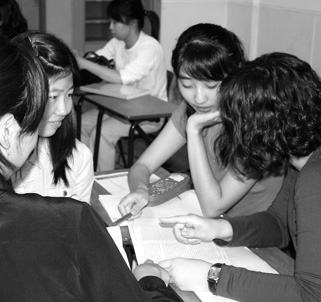
During a course titled "The Beauty of the Human Body," as soon as an announcement goes out saying there will be no team projects, students go wild, clapping and crying out, "Hurrah!"
Just how hard can team projects be? Team projects seem tough enough even with the full cooperation of all team members. There are difficulties like scheduling time, or deciding on a project topic.Given that, one can easily imagine how hard team projects can get when?ome of the members do not even show up at the team meetings let alone actively participate!?tudents refer these people to "free riders."
The Ewha Voice explored the free rider problem by listening to the voices of Ewha students and professors, and getting guidelines on how to make team projects run smoothly from the Ewha Student Counseling Center.
Michelle Chung,a graduate of the University of California, San Diego and currently studying Korean language at the International Education Institute (IEI), thinks free rider problems occur when students get put in a group they don't like or when they don't know anyone in the group. "If you like your team and are familiar with everyone in your team you feel more responsible for your share of work," says Michelle. "When there is a free rider in a group, I think students should tell the professor about the problem and explain how hard it is to share the work equally," she adds.
Chung Eun-sun (English Lang. & Lit. , 4) thinks that a lack of clear responsibility with the "somebody will do it" attitude is the cause of free rider problems. "I think it's a matter of priorities. If students place priority on other courses or on getting a job, they won't actively participate in the project and eventually become free riders,?says Chung. ?enerally, other students seem to talk behind the free rider? back without getting anywhere in solving the problem. But I think it's better to confront the free rider and ask for her reasons. Also, ask if she is willing to take responsibility for her actions," she adds.
Professors also seem to keep the free rider problem in mind when assigning team projects. Professor Kim Min-soo (Business Administration) lets students form groups with people they want. He creates a club for the course in a web community, and constantly keeps an eye on each group by frequently visiting the sub groups made in the club site. Grades on each project go out as a team, but peer evaluation is used as a reference and is included in the final grades. To encourage all members' active participation in team projects, he picks out a "Best Team" to give extra points. "When students go out into the job field, they will be doing a lot of team projects. Although there are students who dread team assignments, I still think it's a good opportunity to practice getting along with people," says Professor Kim.
Professor Kim Eun-mee (International Studies) has a system of asking students to state how much each student contributed to the group. She explains that she started the system because there were students who felt that other members on their teams were not putting in equal work. But, still encouraging team projects, Professor Kim says, "I believe that students sometimes learn more from each other than in the classroom. Students learn how to work in a group and come up with rules of cooperation and compromise. It also allows students to take advantage of each other's strengths while complementing their weaknesses."
The free rider problem may make students avoid courses with lots of group assignments. However, if students consider team projects as a step to learning how to cope with others in the society, perhaps students will find team projects less burdensome, or actually enjoyable. Plus, aren't adjusting conflicting schedules, mulling over a topic, confronting free riders, and staying up all night for the presentation next day the beauty of team projects?
Advice for Smooth Teamwork
1. Clearly divide the task and agree upon what each person's share in the project will be.
2. Leave a record of each member's part of the work. Agree on submitting this record to the professor.
3. Try not to arrange meetings often. Rather, do brief check ups on how everyone's part is developing before or after class.
4. Don't expect that the team members will understand you just because you are their friend.
5. If you cannot do the given task on time, always call and inform the members. (Source: The Ewha Student Counseling Center)

